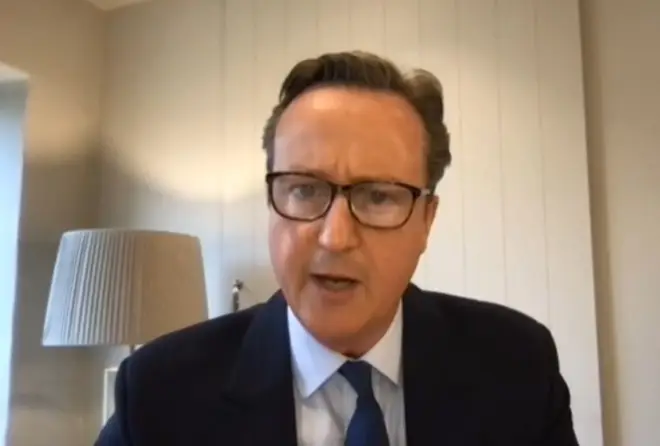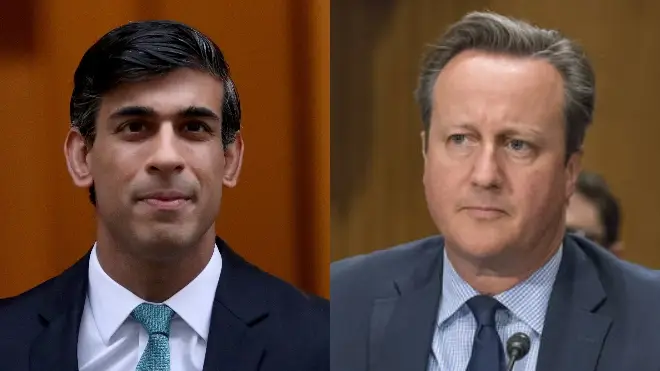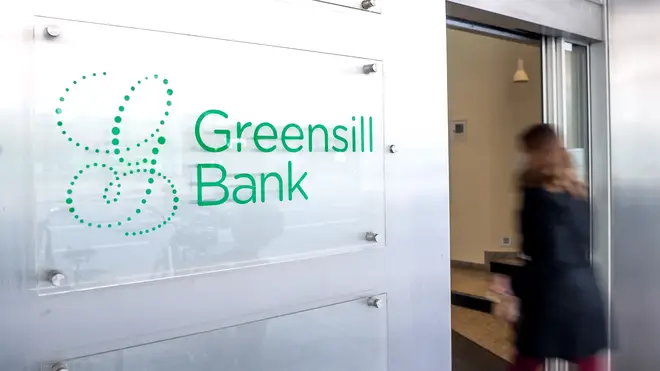
Matthew Wright 7am - 10am
13 May 2021, 11:41 | Updated: 13 May 2021, 19:21

David Cameron accused of WhatsApping his way round Whitehall by MP at Treasury Committee
David Cameron has been grilled by MPs over his lobbying activities for collapsed finance firm Greensill Capital.
The former prime minister appeared at back-to-back hearings by the Commons Treasury and Public Accounts committees on Thursday to assist a probe into the "potentially criminal" collapse of the company.
Dozens of texts and emails were released on Tuesday which showed Mr Cameron appealing to ministers and senior officials for help in gaining access to Government coronavirus support programmes for the firm.
READ MORE: David Cameron's lobbying texts to Sunak and Gove released
They included messages to Chancellor Rishi Sunak and Cabinet Office minister Michael Gove, and senior officials at the Treasury and the Bank of England, as well as a call to Health Secretary Matt Hancock.
Mr Cameron, who joined Greensill as an adviser after he left office, has insisted his lobbying activities broke no rules but accepted there are "lessons to be learned".

David Cameron: 'I was paid far more by Greensill than what I earned as prime minister'
However, there has been criticism of how a former prime minister was able to exploit his personal contacts with former colleagues and officials in the pursuit of commercial gain.
Grilling Mr Cameron during a Treasury Committee meeting on Thursday, Labour MP Siobhain McDonagh accused the Tory former leader of WhatsApping his "way around Whitehall on the back of a fraudulent enterprise based on selling bonds of high-risk debt to unsuspecting investors".
He replied: "My view is that what I did was I made a choice to work for a business which I hoped would be the UK fintech success story - and many people believed that it would - and I wanted to help that company grow and expand.
"What I did at the time of economic crisis was put to the Government what I genuinely believe to be a good idea of how to get money into the hands of small businesses and get their bills paid early."
READ MORE: George Eustice tells LBC 'everyone conducted themselves as we would expect' over Greensill

He added: "I've said that, you know, looking back and now looking forward, your ex-prime ministers are very important and in a different position, and so a single letter or email would be more appropriate.
"But we were in very different circumstances when Covid-19 happened."
Mr Cameron also confirmed he was a "regular" attendee at Greensill Capital board meetings but said there was "no sense of jeopardy" about the firm's future.
The ex-PM refused to tell MPs how much he stood to gain from his involvement with the financial firm, saying only he had a "big economic investment" in its future and that it was "far more than what I earned as prime minister".
He also would not comment on whether or not he could have profited to the tune of millions of pounds if Greensill had been successful, saying he had believed his lobbying was in the public interest.
He told the Treasury Committee: "I was very keen for us to put forward our scheme, because I thought it was absolutely in the public interest to try and get money into small businesses."

Starmer: Greensill scandal is 'just the tip of the iceberg'
Mr Cameron then denied that he lobbied ministers and officials on behalf of Greensill Capital because he feared he would lose out financially if the firm went under.
"I have spent most of my adult life in public service. I believe in it deeply. I would never put forward something that I didn't believe was absolutely in the interests of the public good," he said.
"I did not believe in March or April last year when I was doing this contact there was a risk of Greensill falling over."
He also defended approaching ministers and senior Government officials by text as opposed to email in the context of the pandemic, but acknowledged this was a "lesson" from the controversy.
"It was a time of extraordinary crisis and so it was a time when I think it was appropriate to use phone and text over email and letter," the former prime minister told the Commons Treasury Committee.
"I think, in future, one of the lessons I take away is prime ministers should only ever use letter or email and should restrict themselves far more."


Prior to the committee hearing, the Government backed the former PM over his conduct and that of ministers and officials but stood by its decision to reject funding applications submitted by the firm.
In one message to Mr Sunak, he complained the Treasury's objections to Greensill's application were "nuts", adding: "Think there is a simple misunderstanding that I can explain."
In an exchange with Mr Gove, the former prime minister messaged: "Am now speaking to Rishi first thing tomorrow. If I am still stuck, can I call you then?"
"Of course! Any time," Mr Gove responded.
Meanwhile, the City watchdog has said it is launching a formal investigation into the collapse of Greensill which filed for insolvency in March.
The Financial Conduct Authority said some of the allegations made about the firm were "potentially criminal in nature".

Rachel Reeves condemns David Cameron's 'sleazy' Greensill lobbying
Greensill was the biggest backer of GFG - the owner the UK's third-largest steelmaker, Liberty Steel - and its failure has put thousands of jobs at risk as GFG seeks to refinance.
Appearing before the Treasury Committee on Tuesday, the firm's founder, Australian financier Lex Greensill, said he was "truly sorry" and took full responsibility for what happened.
In a letter to the committee, Mr Cameron said he first became concerned that the company might be in serious financial difficulty in December last year.
"Up until that point, I firmly believed that Greensill was in good financial health," he said.
The lobbying revelations sparked a series of new allegations, dubbed 'Tory sleaze' by critics, bringing the conduct of ministers and the PM into question.
Just yesterday it was revealed the Prime Minister has a county court judgment for a £535 debt, while questions remain over who originally paid for the refurbishment of his Downing Street flat and his £15,000 holiday to Mustique last year.